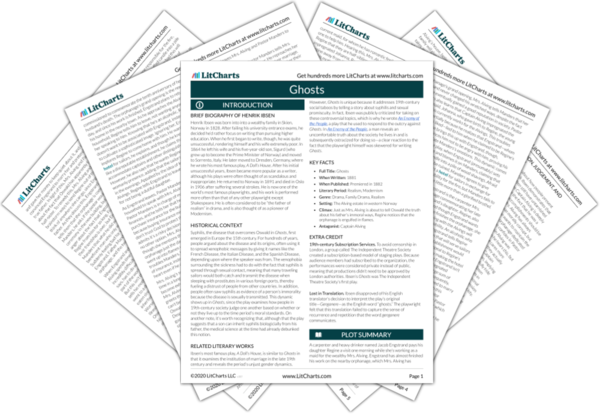Reputation, Judgement, and Morality
In Ghosts, a play about how people present themselves, Henrik Ibsen demonstrates that people leading immoral lives often still have untarnished reputations. In particular, the late Captain Alving is deeply revered by his community, despite the fact that he was a philandering alcoholic whose only accomplishments should be attributed to his wife, Mrs. Alving. Mrs. Alving has always wanted to confess that her husband was morally corrupt, but has refrained from doing so…
read analysis of Reputation, Judgement, and MoralityDuty and Self-Sacrifice
In Ghosts, Henrik Ibsen invites audiences to contemplate the expectations that individuals place upon one another. The playwright asks how much, exactly, people can depend on their loved ones to help them through difficult times, ultimately suggesting that certain requests can become unfair burdens. For instance, Captain Alving depends on his wife, Mrs. Alving, to maintain his public image, putting an enormous strain on her as she struggles to hide his debauchery. Unfortunately…
read analysis of Duty and Self-SacrificeThe Past, Inheritance, and Moving On
Ghosts is a play about how the past influences the present. The play’s Norwegian title, Gengangere, is the Danish word for ghosts, but it also has connotations of repetition, suggesting that Ibsen is interested in examining how the past repeats itself. This is evident in many ways throughout the play, as Oswald Alving’s life begins to resemble his late father’s, despite the fact that he has supposedly led a much different existence…
read analysis of The Past, Inheritance, and Moving On
Wealth and Manipulation
In Ghosts, Henrik Ibsen criticizes society’s fixation on economic success. More specifically, the playwright condemns the fact that people often prioritize wealth and other superficial indicators of success over actual happiness, or even morality. This is especially true for Jacob Engstrand, who thinks almost exclusively about his chances of making money and attaining some form of upward mobility. Similarly, Regine tries to leverage her job as a maid in the Alving household so…
read analysis of Wealth and Manipulation






